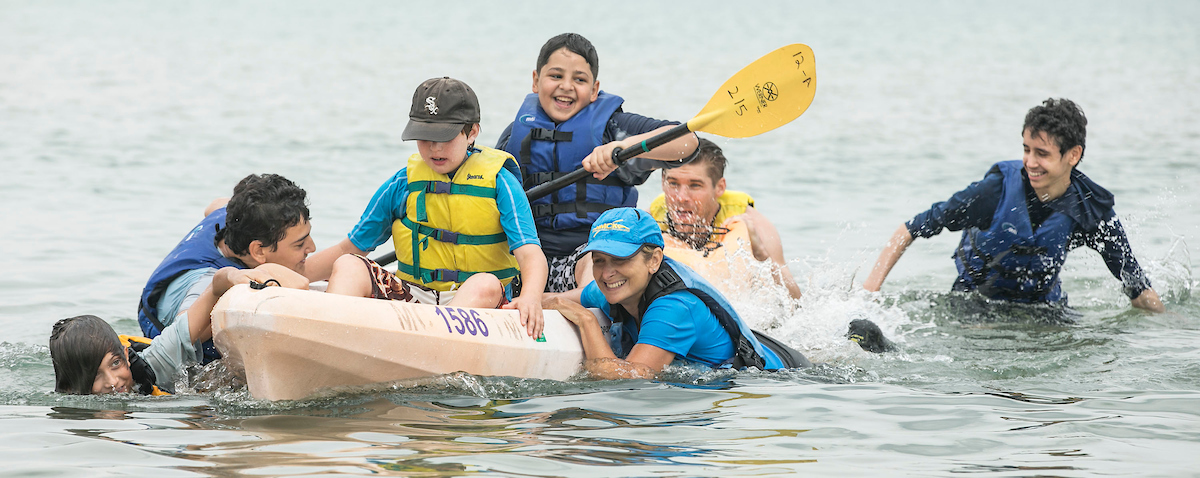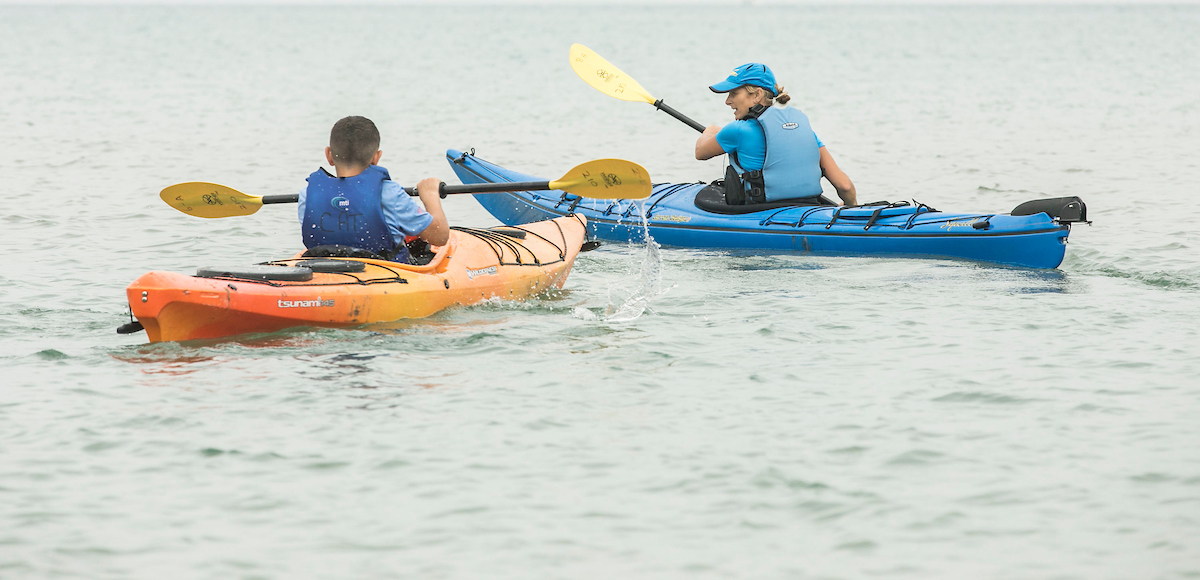 Shana Wills (bottom right, blue shirt), an adjunct faculty member in the School for New Learning, launched REACH in 2015, a nonprofit dedicated to helping young refugees hone their leadership and science skills through outdoor adventures, all while offering them the opportunity to interact with other refugee youth. (DePaul University/Jamie Moncrief)
Shana Wills (bottom right, blue shirt), an adjunct faculty member in the School for New Learning, launched REACH in 2015, a nonprofit dedicated to helping young refugees hone their leadership and science skills through outdoor adventures, all while offering them the opportunity to interact with other refugee youth. (DePaul University/Jamie Moncrief)
DePaul alum Shana Wills has traveled the world studying and advocating for refugee and immigrant rights, civil conflict and social justice. Now an adjunct faculty member in the School for New Learning, Wills has spent the last 14 years educating DePaul students about international human rights issues. Read on to learn about the various organizations she works with and how they play a role in her time on campus.
Besides teaching at DePaul, can you tell me about your work?
In the past, much of my professional and volunteer work focused on human rights and social justice issues that had an impact on Africa or Africans. Back in the 1990s, I launched a school for war-affected children between the ages of 10 and 18 in Angola, Africa at the height of the country's civil war. This proved to be a pivotal point in my worldview.
As my work evolved, I began to professionalize my skills around nonprofit administration, refugee rights and culturally-competent refugee integration. Today, I work as a part-time consultant for local organizations providing services to refugees and immigrants, I review federal grant proposals for the Office of Refugee Resettlement and other offices in the U.S. Department of Health and Human Services on a contractual basis, and I work full-time as development director at a local community organizing powerhouse.
What is REACH and why is it important?
REACH aims to provide refugee youth and their families with experiential learning opportunities focused on STEAM-related education and adventure sports, like canoeing, hiking and rock climbing. Our mission is to inspire leadership, academic success and connections among refugee youth through active dynamic learning outside the classroom.
Refugee youth who participate in REACH's programs focus on gaining skills in English language proficiency, interpersonal dynamics, teambuilding, leadership, STEAM education, service learning and outdoor adventure sports. There currently are no other organizations like this that specifically serve refugee youth. In the future, we hope to provide refugee families whose children are involved in REACH with support services, such as in-depth intake and follow-up assessments, home visits and workshops.
Where did you get the idea to start the nonprofit?
Refugee adolescents are often faced with the difficult task of bridging their traditional home culture and the pressures of American youth culture. This causes a lot of familial turmoil and often puts them at risk of gang involvement, depression, school drop-outs and even suicide. When I served as director of Refugee and Immigrant Community Services at Heartland Alliance, I had a pet project called the Youth Leadership Network. The idea was to build leadership development and civic engagement skills among recently arrived refugee youth, connect them to other mainstream youth and organizations to develop and implement community service projects, and inspire them to advocate on behalf of their own communities. The program was very successful and the refugee youth were empowered.
Although I've always said I would never start a new nonprofit because there are so many organizations doing good work already, I found myself unable to escape the itch to do something more for these at-risk newcomer youth. Most of my brainstorming took place during my own personal time, which I tend to spend hiking, biking or kayaking. At some point it clicked that being active in the outdoors, challenging myself to tackle new goals and trying difficult activities were ways that I connected with nature, blew off steam and gained self-esteem. It suddenly made sense that this might work, too, for refugee teens. After running a pilot project in the summer of 2015, I officially launched REACH as a nonprofit in 2016.
Does your experience with REACH and other organizations play a role in your work at DePaul?
Over the years I've taught several courses in SNL on topics such as globalization and technology, corporate social responsibility and grassroots social change, social justice, African American studies and migration studies. My outside work has influenced my lectures, allowed me to lend real personal stories to classroom discussions and helped me to connect my students and advisees to local and international organizations for hands-on experience.
How can folks get involved with REACH?
We are always looking for volunteers to serve as docents on any of our many outings, to function as adult mentors for the participants, or to assist with administrative tasks like blog stories, website maintenance and photography. We also would love to work with DePaul faculty to integrate more STEAM-focused curricula into our activities, to employ student interns and to apply real research methodologies.
 Shana Wills (right) keeps a watchful eye on her mentees as she leads them onto Lake Michigan in kayaks on a field trip in August. (DePaul University/Jamie Moncrief)
Shana Wills (right) keeps a watchful eye on her mentees as she leads them onto Lake Michigan in kayaks on a field trip in August. (DePaul University/Jamie Moncrief)